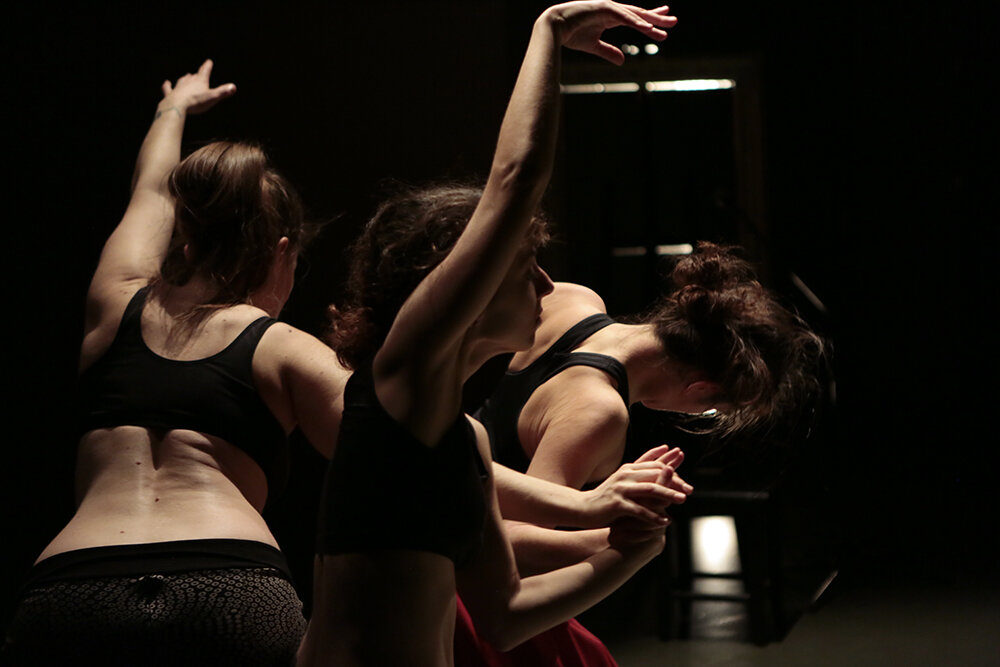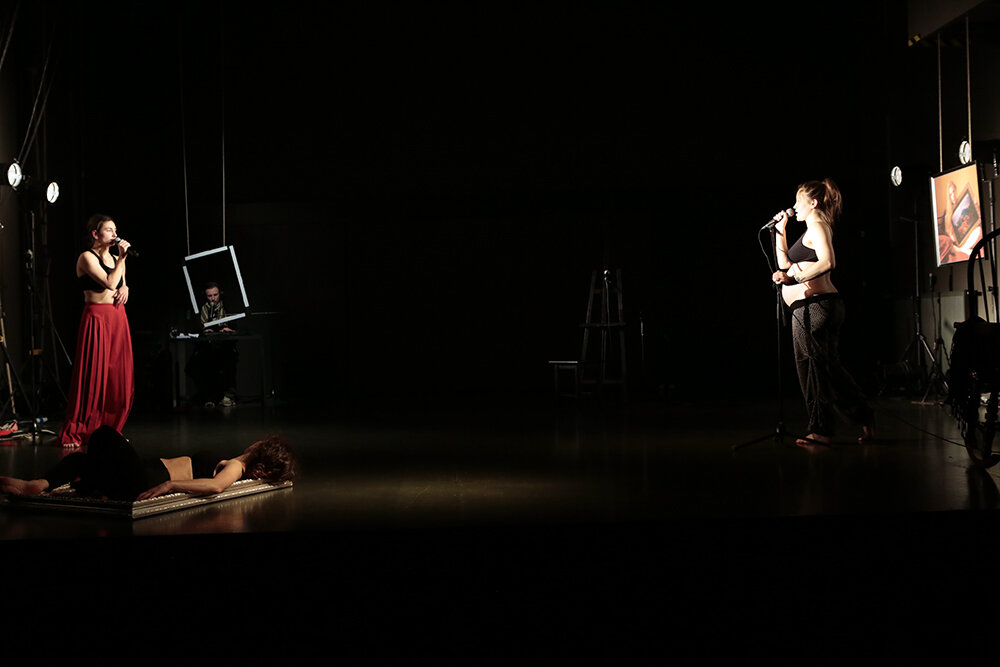Gregor Luštek
TRI SESTRE - PREMIERA / THREE SISTERS - PREMIERE
avtorski plesni in raziskovalni projekt / an author dance and research project
Koreografija in režija / Choreography & Direction: GREGOR LUŠTEK
Avtorji besedila in nastopajoči / Authors of Text and Performers: BETTINA FÖLDESI, ROSELLA PELLICCIOTTI, KRISTÝNA ŠAJTOŠOVA, ŽIGAN KRAJNČAN
Dramaturgija / Dramaturgy: MATIC STARINA
Avtorja glasbe / Original Music: BRANKO ROŽMAN, ŽIGAN KRAJNČAN
Asistentka koreografije / Choreography Assistant: KAJA LORENCI
Asistent režije / Direction Assistant: JUŠ ZIDAR
Oblikovalca svetlobe / Lighting Designers: JUŠ ZIDAR, SIMON ŽIŽEK
Oblikovanje kreative / Creative Design: EVA MLINAR
Koprodukcija / Co-produced by: ANTON PODBEVŠEK TEATER & PLESNI TEATER LJUBLJANA
LIVE STREAM & PRODAJA VSTOPNIC / TICKETS: TRETJI ODER
Vstopnice / Tickets: 8€, informacije o vstopnicah tudi na naslovu info@tretjioder.si ali po telefonu 040 530 244 vsak delavnik med 14:00 in 16:00 in 1 uro pred predstavo.
Program Plesnega Teatra Ljubljana sofinancirata Ministrstvo za kulturo RS in Mestna občina Ljubljana, Oddelek za kulturo / The programme of Plesni Teater Ljubljana is subsidized by the Ministry of Culture RS and Municipality of Ljubljana, Department for Culture
Foto / Photo: BARBARA ČEFERIN
O predstavi
Tri sestre je avtorski plesni in raziskovalni projekt, ki v izhodišču izhaja iz premišljevanja pozicije umetnika kot delavca v času, ko posameznikovo identiteto, morda bolj kot kdaj koli, definira njegova produkcijska in proizvodna vrednost. Potencial umetnosti, njen emancipatorični moment, hoče iskati predvsem in zlasti v njenem združevalnem potencialu, v utopičnem iskanju skupnega in skupnosti, ki ohranja intimo in intimizem - ne glede na politični, ekonomski, nacionalni, verski ali kakršni koli drugi hierarhični faktor hegemonije.
Skozi konkretno združitev internacionalno zastavljenega uprizoritvenega kolektiva, zavezanega skupni ideji, skupnemu estetskemu idealu odnosa do univerzuma, skupnemu etičnemu kodeksu, neko obliko vsebinske ideje udejanja že z lastno prezenco, tj. prisotnostjo lastnega {plešočega} telesa na odru. Projekt torej išče potencial umetnosti v njeni združevalni in kolektivni zmožnosti, ki nastaja kot šiv razlike, istosti in drugosti.
Uprizoritev je formalno zamišljena kot presek treh sodobnih scenskih praks: dokumentarnega, osebno izpovednega in plesno nemimetičnega gledališča. Dokumentarno in motivno fabulativno izhodišče projekta je osrediščeno okrog osebnih biografij treh plesalk, {Bettina Földesi, Rosella Pellicciotti in Kristýna Šajtošova}, ki so se priselile v Slovenijo k svojim ljubezenskim partnerjem {Matic Starina, Žigan Kranjčan, Juš Zidar}; vsem trem delujočim na polju uprizoritvenih umetnosti, ki bodo aktivirani v različnih oblikah v pričujoči plesni emancipaciji.
Uprizoritev je zastavljena kot avtentični prostor emancipacije, ki združuje šest protagonistov, tj. treh parov. V njihovih intimnih vezeh, potezah, oblikah, razlikah, odporih se išče gradivo za skupno naracijo, kjer njihov gestus intime in intimizma postaja del interakcije skupnega z občinstvom.
Skozi iskanje kolektivnega umetniškega jezika, katerega medij je predvsem plešoče telo, se išče izpolnjenje v odnosih, tudi ljubezenskih - onstran okvirov ekonomsko-političnega neoliberalizma dejanskosti. V uprizoritvi s prezentacijo lastnega singularnega, z vsem, kar jih v realni dejanskosti določa {status migrantk, brezposelnih, nenazadnje tudi status partnerk, žensk, umetnic …} v njihovem novem kulturnem kontekstu, nastaja{jo} kot umetniško delo samo na sebi.
Če pritrjujemo Heglu, da zavest obstaja zgolj v odnosu do druge zavesti, definirajmo zavest treh žensk, ki jih v uprizoritvi imenujemo tri sestre. Ali jim pripada status Čehovljevih treh sester, ki jih vodi hrepenenje po spremembi, po novem življenju, po drugačnem družbenem kontekstu, znotraj katerega je mogoče iskati {umetniško} izpolnjenje? Ali gre morda za tri sestre iz Kralja Leara, katerih zavesti se definirajo v odnosu do imena Očeta? Ali pa gre morda zgolj za vsakdanje, običajne in za svet popolnoma nepomembne ženske - tri ženske, tri ljubice, tri umetnice, ki v iskanju izpolnjenja zapustijo svoj rojstni kraj in iščejo svoj prihodnjik v popolnoma drugačnih kontekstih nekega drugega zemljevida?
V potovanju skozi intimizem iščemo tista spoznanja in izkustva, ki so skrajno osebna, a hkrati {tudi} politična – bistvena za uvid v razumevanje družbenega in kolektivnega.
About the performance
Three sisters is an author dance and research project, which originates from contemplation on the position of an artist as a worker in a time when the individual’s identity is, probably more than ever, defined by his production and manufacturing worth. The potential of art, its emancipatory moment, is to be found primarily and particularly in its unifying promise, in the utopian search for the commonality and community, which preserves intimacy and intimism – regardless of the political, economic, national, religious or any other hierarchical factor of hegemony.
Through the actual union of the internationally joined performing team bound to the common idea, a common aesthetic ideal of the relationship towards the universe, a common ethical code, some form of substantive idea is already realized by its own presence, i.e. the presence of its own (dancing) body on the stage. Thus, the project is looking for the potential of art in its unifying and collective ability which is created as a combination of difference, sameness and otherness.
The performance is formally conceived as a cross-section of the three modern stage practices: documentary, lyrical and non-mimetic dance theatre. The documentary and the fable-based motif of the project revolves around the personal biographies of three dancers (Bettina Földesi, Kristyna Šajtošova in Rosella Pelliccotti) who moved to Slovenia to be with their romantic partners (Matic Starina, Žigan Kranjčan, Juš Zidar); all three working in the field of performing arts which will be activated in various forms of the present dance emancipation.
The performance is conceived as an authentic sphere of emancipation which unifies six protagonists, i.e. three couples. In their intimate bonds, moves, forms, differences, resistances the subject for common narration is searched, where their gestures of intimacy and intimism become a part of interaction shared with the audience.
Through the quest for the collective artistic language whose medium is foremost the dancing body, a fulfilment in relationships, also love ones – beyond the frameworks of economic-political neoliberalism of actuality is searched. In the performance with the presentation of its own singular, with everything that defines them in the realistic actuality (the status of female migrants, the unemployed, nevertheless the status of girlfriends, women, female artists…) in their new cultural context they are created as an artwork in itself.
If we affirm Hegel in his claim that consciousness exists only in relation to another consciousness, let us define the consciousness of the three women, who we call three sisters in our production. Do they deserve the status of Čehov’s three sisters, driven by the yearning for change, a new life, a different social context within which it is possible to search for artistic fulfilment? Or is it the three sisters from King Lear, whose consciousnesses are defined in relation to their Father’s name? Or is it perhaps the mundane, ordinary and, in the eyes of the world, insignificant women – three women, three lovers, three artists who in search of fulfilment leave their birth place and look for their future in entirely different contexts of some other map?
On the journey through intimism we look for all of the realizations and experience, which are highly personal but at the same time (also) political – crucial for the insight into the understanding of the social and collective.
Anton Podbevšek Teater (APT) je prva in najmlajša slovenska profesionalna gledališka institucija, ustanovljena in delujoča na področju Dolenjske in Bele krajine. Imenuje se po Antonu Podbevšku - prvemu slovenskemu avantgardistu in »frontmanu« umetniškega gibanja, iz katerega je zrasla prva slovenska umetniška avantgarda, imenovana »novomeška pomlad«. Ime institucije govori o aktivni ontološki usmeritvi institucije. Znotraj gledališkega polja je ta usmeritev pot in raziskava znotraj pokrajin sodobne umetnosti, usmerjena v performativne, scenske, gibalne in zvočne raziskave, povezane z refleksijo etike v polju kritike ideologije vsakdanjega življenja.
The Anton Podbevšek Teater (APT) is the youngest professional Slovenian theatre and the first to be established and to operate in the region of Dolenjska and Bela krajina. It is named after Anton Podbevšek, the first Slovenian avant-garde poet and the 'front man' of the artistic movement that gave rise to the first Slovenian artistic avant-garde called the Novo mesto spring. The name suggests an active ontological direction taken by the theatre. Within the theatrical field, this direction is a path and an exploration within the realm of modern art and is focused on the exploration of performance, scenery, movement and sound connected to the reflection of ethics in the field of the criticism of everyday life ideology.




